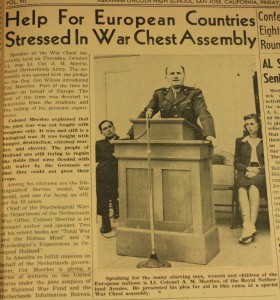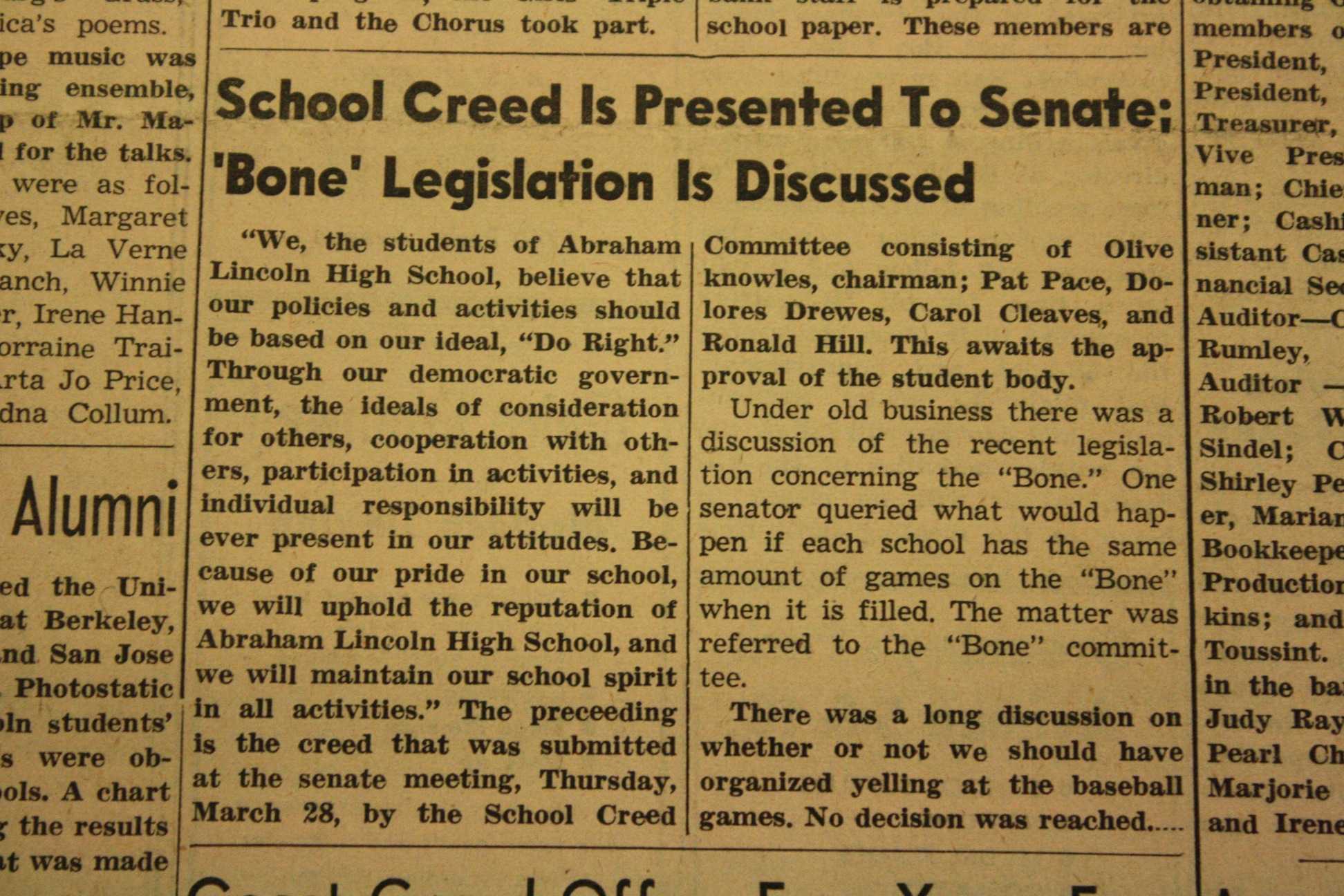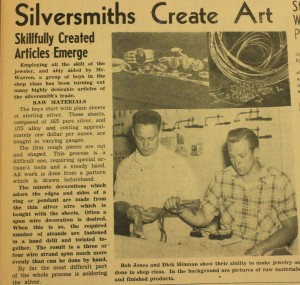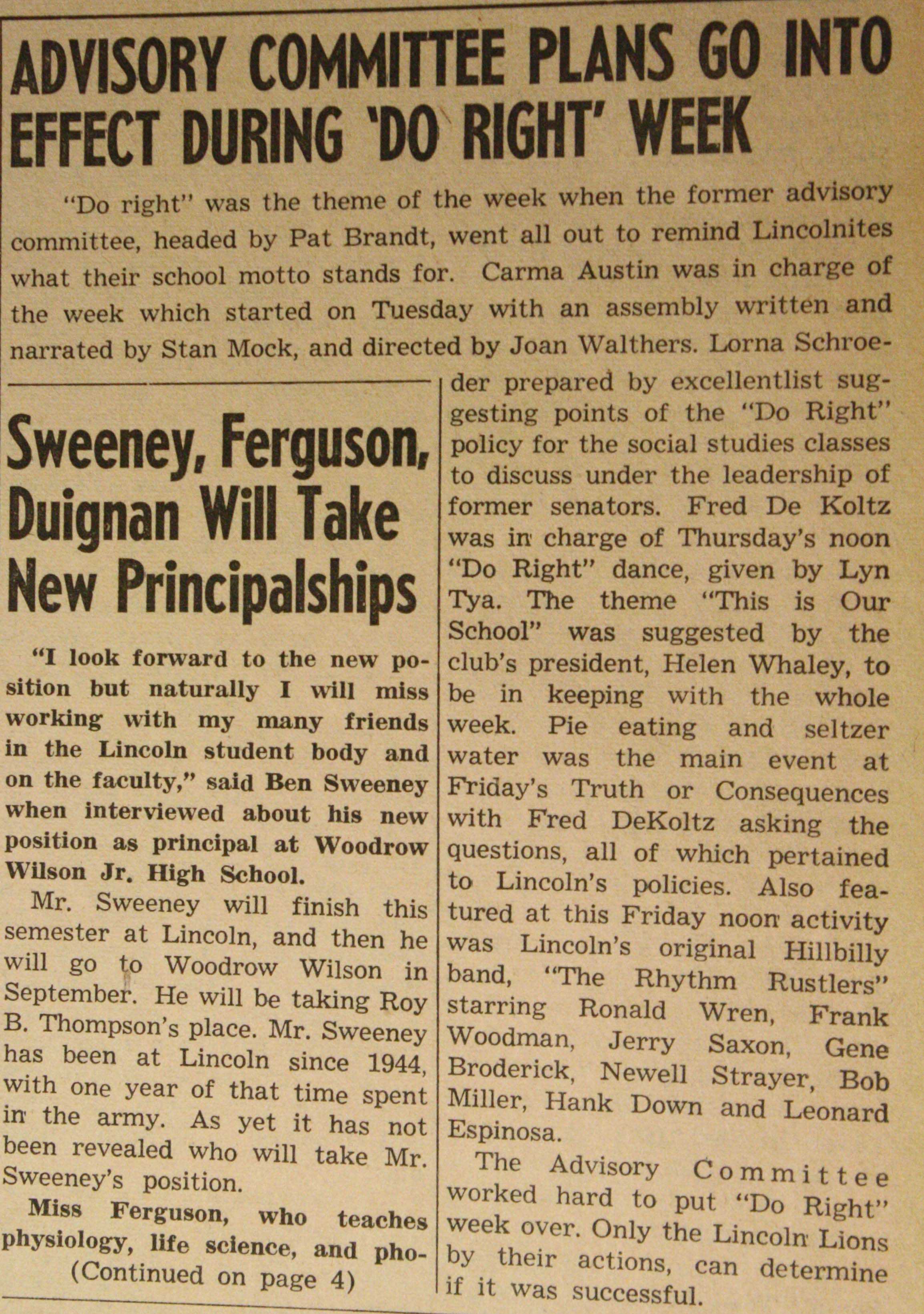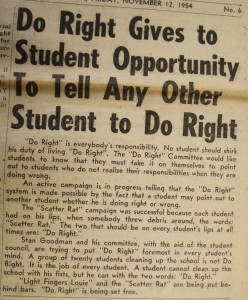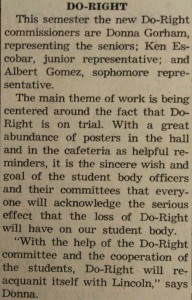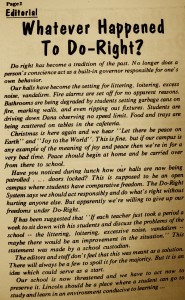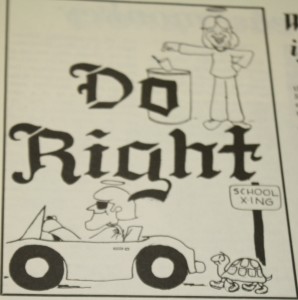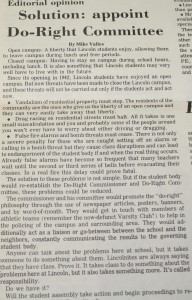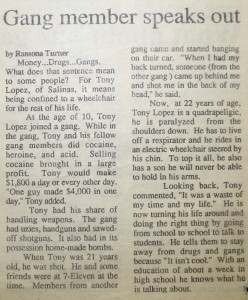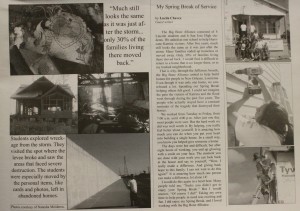“Do Right”
“Do Right” : Lincoln’s Motto
Abraham Lincoln High School in San Jose California, was founded in 1942 with the school motto of “Do Right.” This film, produced by students at Lincoln, explores that history, and the state of “Do Right” in 2013.
“A Word On Lockers”
From the January 25, 1945 edition of “Lion Tales.”
When it rains, about the only thing you can do with a coat and umbrella, mainly composed of water, is hang them over your locker. Consequently the locker stands wide open and acts as a show case to show off remains of box lunches, bottles, battered books, papers, and anything you might have. This array, so common on rainy days, could be avoided.
If lockers were kept in reasonable order, they wouldn’t make the halls look like a bargain sale’s remains when the doors are open. Cooperation is needed to make our halls look “right.” One person can clean his locker and make the hall look better, but it takes a lot of clean lockers to make a hall look “right.”
-Alice Helm
###
“Help For European Countries Stressed In War Chest Assembly”
From the October 12, 1945 edition of “Lion Tales”
In America to fulfill missions on behalf of the Netherlands government, Col. Meerloo is giving a series of lectures in the United States under the joint auspices of the National War Fund and the Netherlands Information Bureau.
###
“Sewing Classes Make Garments for Red Cross”
From the November 21, 1945 edition of “Lion Tales.”
Sewing classes are working on articles for the Red Cross. Each girl is to make at least one article. The hats, dresses, slips, blouses, skirts, coats, and other articles of clothing will be given to the children of Europe.
Mr.Ben Howard’s Social Studies classes are working on reports from the Chronicles of America series. The reports will be given orally and an account will be written. Yale university puts out the chronicle.
On Nov. 14 the Interior Decorating class turned in the notebooks they have been working on for the past six weeks. The covers of the book were made by the class and decorated with finger painting. Magazine clippings depicted the different periods of furniture made up the contents of the books. Some of the books have illustrations of kitchens and different flower arrangements. The group is now continuing on floor plans and continuing with their flower arranging. They expect to make several trips uptown to study furniture. There is a possibility that they will go to San Francisco.
Miss Maude Ingles’ cooking classes have just completed their experiments with cake baking and started on the making of pies.
###
Mr. Shipp Stresses School Motto
From the March 2, 1945 edition of “Lion Tales.”
For a brief period between fifth and sixth periods last Thursday, February 22, Mr. Shipp called a special assembly to talk things over. He said he thought it was a good idea to hold a such meeting of the student body to get various grieves off his mind and that he probably would not call another assembly to discuss rules and attitudes within the school for another six months.
Several different phases of the rule “Do Right” were covered by Mr. Shipp; he expressed his wish to have all rules remain in that one, but showed his authority to do otherwise.
After the assembly was over everyone was supposed to go to their sixth period class and school was dismissed a half hour early.
###
“Assemblies Are Held To Discuss Problems”
From the March 15, 1946 edition of “Lion Tales.”
Seven members of the Abraham Lincoln student body talked in assemblies that were held, all day Tuesday, March 12th, about school problems. These panel discussions were held every period with the students going to hear them during their social studies class periods.
Bill Passey was the leader of these discussions. Jerry Bosley, Jim Lovely, Peggy Carter, Ingie Alm, Virginia Cox and Phil Lively made up the list of student speakers.
###
“School Creed Is Presented to Senate; ‘Bone’ Legislation Is Discussed”
From the April 5, 1946 edition of “Lion Tales.”
“We, the students of Abraham Lincoln High School, believe that our policies and activities should be based on our ideal, “Do Right.” Through our democratic government, the ideals of consideration for others, cooperation with others, participation in activities, and individual responsibility will be ever present in our attitudes. Because of our pride in our school, we will uphold the reputation of Abraham Lincoln High School, and we will maintain our school spirit in all activities.” The preceding is the creed that was submitted at the senate meeting, Thursday, March 28, by the School Creed Committee consisting of Olive knowles (sic), chairman; Pat Pace, Dolores Drewes, Carol Cleaves, and Ronald Hill. This awaits the approval of the student body.
Under old business there was a discussion of the recent legislation concerning the “Bone.” One senator queried what would happen if each school has the same amount of games on the “Bone” when it is filled. The matter was referred to the “Bone” committee.
There was a long discussion on whether or not we should have organized yelling at the baseball games. No decision was reached.
###
“Silversmiths Create Art”
From the May 21, 1948 issue of “Lion Tales”
Skillfully Created Articles Emerge
Employing all the skill of the jeweler, and ably aided by Mr. Warren, a group of boys in the shop class has been turning out many highly desirable articles of the silversmith’s trade.
By far the most difficult part of the whole process is soldering the silver.
###
“Advisory Committee Plans Go Into Effect During ‘Do Right’ Week”
From the February 21, 1949 edition of “Lion Tales.”
Do-Right is one of our oldest and cherished traditions. It began in 1942, when Lincoln’s first principal, Mr. Fred Shipp, explained that Lincoln would be a unique school. It would be without the usual number of specific rules of conduct. In conclusion to his first speech at Lincoln, 23 years ago, he said, “All we expect is that each one of you do what you think is right!” From this speech came our motion and creed: DO-RIGHT. It has lasted through the war years, the fifties and now the sixties.
It has lasted because each student accepted the responsibilities which go with this motto. They did not abuse or take advantage of the creed.
Lincoln students use their conscience as their guide; not teachers always pointing the way. They treat others as they would like to be treated. Does this sound too simple to be of value? Imagine rallies and assemblies with a teacher for every fifty students, watching and distrusting. Imagine a system of student government unable to accomplish a Senate meeting without constant observation from the principal. This is what a school is without Do-Right.
Students of Lincoln High not only accept Do-Right, but also are proud of it.
###
“Do Right” Emphasized
From the October 1, 1954 edition of “Lion Tales”
“Do Right” has been on everyone’s lips this fall as school re-opened. The upperclassmen have enjoyed explaining our unique system of government and way of school-life to the incoming sophomores and new students.
Orientation assemblies have been given for the sophomores to help them learn “Do Right” more quickly and easily. Their first introduction to “Do Right” was given at an assembly just before school started.
The next assembly was held during the first week of school also for sophomores. The theme was “Do Right Is Courtesy.” Dr. Kennedy, Mr. Hunter and the student body officers made speeches on smoking, car and assembly regulations. The general meaning of “do Right” was explained.
During the second week of school there was another assembly held for sophomores. This one touched on the duties of the officers. They were also told of the many activities that may be joined at Lincoln. Student speakers told about: GAA- Rose Sanchea; Block L – Harry Rodda; student body cards – Judy Maderis, and spirit – Helen Kotsiopulos.
Last Wednesday the last assembly about “Do Right” had the theme “Scholastic Achievement.” Mrs. Clark was the principal speaker. Dr. Kennedy and Mr. Hunter also contributed their ideas.
“Do Right” assemblies were also held for the Juniors and Seniors emphasizing the importance of “Do Right.” The upper classmen were reminded of the smoking car, and assembly regulations.
###
“Do Right Gives To Student Opportunity To Tell Any Other Students To Do Right”
From the November 12, 1954 edition of “Loin Tales”
“Do Right” is everybody’s responsibility. No student should shirk his duty of living “Do Right”. The “Do Right” Committee would like students to know that they must take it on themselves to point out to students who do not realize their responsibilities when they are doing wrong.
An active campaign is in progress telling that the “Do Right” system is made possible by the fact that a student may point out to another student whether he is doing right or wrong.
The “Scatter Rat” campaign was successful because each student had on his lips, when somebody threw debris around, the words: “Scatter Rat.” The two that should be on every student’s lips at all times are “Do Right.”
Stan Goodman and his committee, with the aid of the student council, are trying to put “Do Right” foremost in every student mind. A group of twenty students cleaning up the school is not Do Right. It is the job of every student . A student cannot clean up the school with his fists, but he can with the two words: “Do Right.”
“Light Fingers Louie” and the “Scatter Rat” are being put behind bars. “Do Right” is being set free.
###
“Do Right”
From the February 25, 1966 edition of “Lion Tales”
This semester the new Do-Right commissioners are Donna Gorham, representing the seniors; Ken Escobar, junior representative; and Alber Gomez, sophomore representative.
The main theme of work is being centered around the fact that Do-Right is on trial. With a great abundance of posters in the hall and in the cafeteria as helpful reminders, it is the sincere wish and goal of the student body officers and their committees that ever-one will acknowledge the serious effect that the loss of Do-Right will have on our student body.
“With the help of the Do-Right committee and the cooperation of the students, Do-Right will reacquaint itself with Lincoln,” says Donna.
###
Take Easy Way Out
March 18, 1966
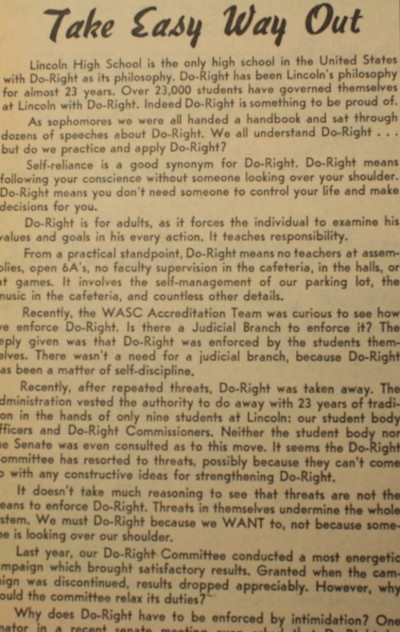
Lincoln High School is the only high school in the united states with Do-Right as its philosophy. Do-Right has been Lincoln’s philosophy for almost 23 years. Over 23,000 student shave governed themselves at Lincoln with Do-Right. Indeed Do-Right is something to be proud of.
As sophomores we are all handed a handbook and sat through dozens of speeches about Do-Right. We all understand Do-Right… but do we practice and apply Do-Right?
Self-reliance is a good synonym for Do-Right. Do-Right means following your conscience without someone looking over your shoulder. Do-Right means you don’t need someone to control your life and make decisions for you.
Do-Right is for adults, as it forces the individual to examine his values and goals in his values and goals in his every action. it teaches responsibility.
From a practical standpoint, Do-Right means no teachers at assemblies, open 6A’s, no faculty supervision in the cafeteria, in the halls, or at games. It involves the self-management of our parking lot, the music in the cafeteria, and countless other details.
Recently, the WASC Accreditation Team was curious to see how we enforce Do-Right. Is there a Judicial Branch to enforce it? The reply given was that Do-Right was enforced by the students themselves. There was no need for a judicial branch, because Do-Right has been a matter of self-discipline.
Recently, after repeated threats, Do-Right was taken away. The administration vested the authority to do away with 23 years of tradition in the hands of only nine students at Lincoln: our student body officers and Do-Right Commissioners. Neither the student body nor the Senate was even consulted as to this move. It seems the Do-Right Committee has resorted to threats, possibly because they can’t come up with any constructive ideas for strengthening Do-Right.
It doesn’t take much reasoning to see that threats are not the means to enforce Do-Right. Threats in themselves undermine the whole system. We must Do-Right because we WANT to, not because someone is looking over our shoulder.
Last year, our Do-Right Committee conducted a most energetic campaign which brought satisfactory results. Granted when the campaign was discontinued, results dropped appreciably. However, why should the committee relax its duties?
Why does Do-Right have to be enforced by intimidation? One senator in a recent senate meeting even asked that Do-Right be abolished so that students could find out what they were missing. I ask, why cut off your right arm to find out what it’s like with just one?
###
Editorial: Discard Do-Right?
June 2, 1967
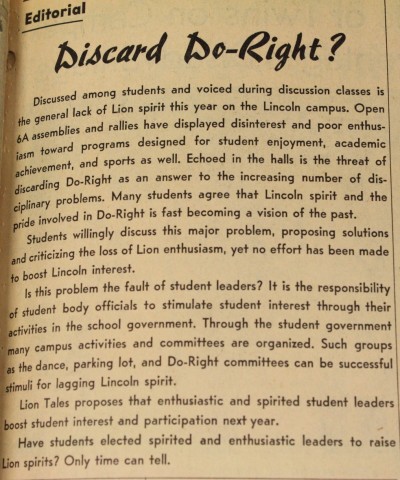
Discussed among students and voiced during discussion classes is the general lack of Lion spirit this year on the Lincoln campus. Open 6A assemblies and rallies have displayed disinterest and poor enthusiasm toward programs designed for student enjoyment, academic achievement, and sports as well. Echoed in the halls is the threat of discarding Do-Right as an answer to the increasing number of disciplinary problems. Many students agree that Lincoln spirit and the pride involved in Do-Right is fast becoming a vision of the past.
Students willingly discuss this major problem, proposing solutions and criticizing the loss of Lion enthusiasm, yet no effort has been made to boost Lincoln interest.
Is this problem the fault of student leaders? It is the responsibility of student body officials to stimulate student interest through their activities in the school government. Through the student government many campus activities and committees are organized. Such groups as the dance, parking lot, and Do-Right committees can be successful stimuli for lagging Lincoln spirit.
Lion Tales proposes that enthusiastic and spirited student leaders boost student interest and participation next year.
Have students elected spirited and enthusiastic leaders to raise Lion spirits? Only time can tell.
###
We’re Tired of It
October 6, 1967
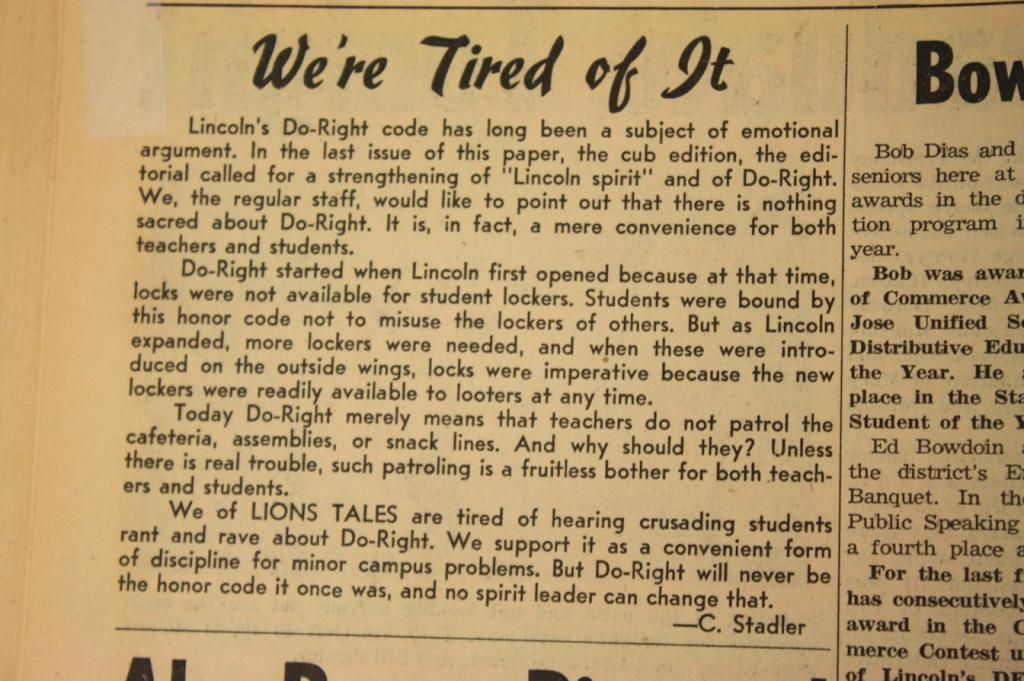
Lincoln’s Do-Right code has long been a subject of emotional argument. In the last issue of this paper, the club edition, the editorial called for a strengthening of “Lincoln spirit” and of Do-Right. We, the regular staff, would like to point out that there is nothing sacred about Do-Right. It is, in fact, a mere convenience for both teachers and students.
Do-Right started when Lincoln first opened because at that time,locks were not available for student lockers. Students were bound by this honor code not to misuse the lockers of others. But as Lincoln expanded, more lockers were needed, and when these were introduced on the outside wings, locks were imperative because the new lockers were readily available to looters at any time.
Today Do-Right merely means that teachers do not patrol the cafeteria, assemblies, or snack lines. And why should they ? Unless there is real trouble, such patrol is a fruitless bother for both teachers and students.
We of LIONS TALES are tired of hearing crusading students rant and rave about Do-Right. We support it as a convenient form of discipline for minor campus problems. But Do-Right will never be the honor code it once was, and no spirit leader can change that.
-C. Stadler
###
Do-Right a Philosophy; Emphasis on Individual
March 1, 1968
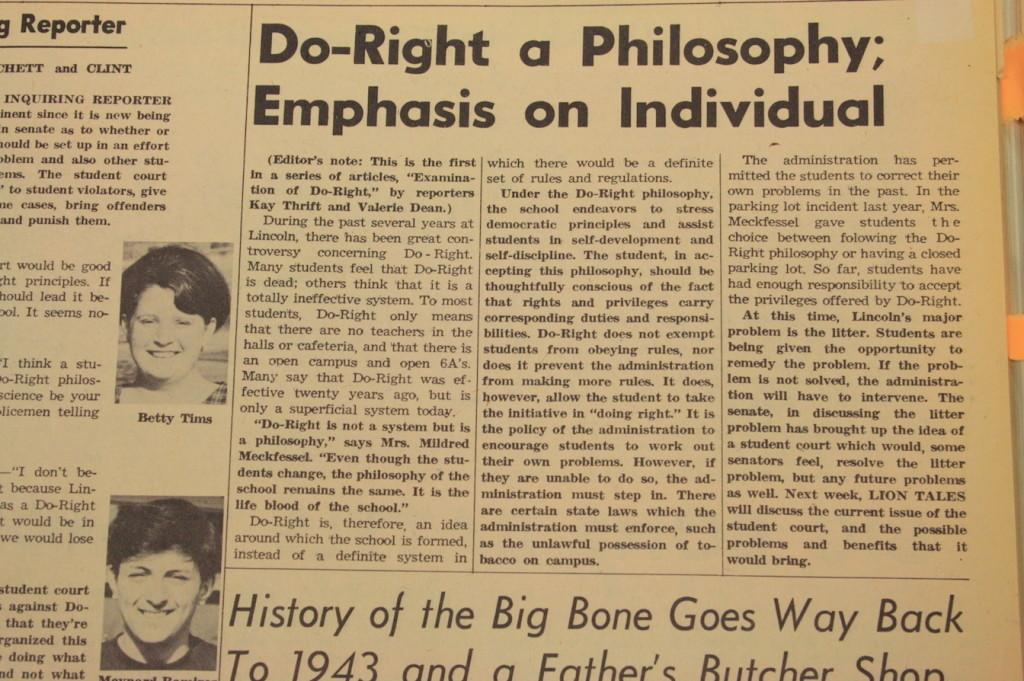
(Editor’s note: This is the first in a series of articles, “Examination of Do-Right,” by
reporters Kay Thrift and Valerie Dean.)
During the past several years at Lincoln, there has been great controversy concerning Do-Right, Many students feel that Do-Right is dead; others think that it is a totally ineffective system. To most students, Do-Right only means that there are no teachers in the halls or cafeteria, and that there is an open campus and open 6A’s. Many say that Do-Right was effective twenty years ago, but is only a superficial system today.
“Do-Right is not a system but is not a system but is a philosophy,” says Mrs. Mildred Meckfessel. “Even though the students change, the philosophy of the school remains the same. It is the life blood of the school.”
Do-Right is, therefore, an idea around which the school is formed, instead of a definite system in which there would be a definite set of rules and regulations.
Under the Do-Right philosophy, the school endeavors to stress democratic principles and assist students in self-development and self-discipline. The student, in accepting this philosophy, should be thoughtfully conscious of the fact that rights and privileges carry corresponding duties and responsibilities. Do-Right does not exempt students from obeying the rules. It does, however, allow students to take the initiative in “Doing-Right.” It is the policy of the administration to encourage students to work out their own problems. However, if they are unable to do so, the administration must step in. There are certain state laws which the administration must enforce, such as the unlawful possession of tobacco on campus.
The administration has permitted the students to correct their own problems in the past. In the parking lot incident last year, Mrs. Meckfessel gave students the choice between following the Do-Right philosophy or having a closed parking lot. So far, students have had enough responsibility to accept the privileges offered by Do-Right.
At this time, Lincoln’s major problem is the litter. Students are being given the opportunity to remedy the problem. If the problem is not solved, the administration will have to intervene. The senate, in discussing the litter problem has brought up the idea of student court which would, some senators feel, resolve the litter problem, but any future problems as well. Next week, LION TALES will discuss the current issue of the student court, and the possible problems and benefits that it would bring.
###
“Whatever Happened To Do-Right?”
From the December 17, 1971 edition of “Lion Tales”
Do right has become a tradition of the past. No longer does a person’s conscience act as a built-in governor responsible for one’s own behavior.
Our halls have become the setting for littering, loitering, excess noise, vandalism. Fire alarms are set off for no apparent reasons. Bathrooms are being degraded by students setting garbage cans on fire, marking walls and even ripping out fixtures. Students are driving down Dana observing no speed limit. Food and trays are being scattered on tables in the cafeteria.
Christmas is here again and we hear “let there be peace on Earth” and “Joy to the World.” This is fine, but if our campus is any example of the meaning of joy and peace then we’re in for a very bad time. Peace should begin at home and be carried over from there to school.
Have you noticed during lunch how our halls are now being patrolled… doors locked? This is supposed to be an open campus where students have comparative freedom. The Do-Right system says we should act responsibly and do what’s right without hurting anyone else. But apparently we’re willing to give up our freedoms under Do-Right.
It has been suggested that, “If each teacher just took a period a week to sit down with his students and discuss the problems of the school — the littering, loitering, excessive noise, vandalism — maybe there would be an improvement in the situation.” This statement was made by a school custodian.
The editors and staff don’t feel that this was meant as a solution. There will always be a few to spoil it for the majority. But it is an idea which could serve as a start.
Our school is now threatened and we have to act now to preserve it. Lincoln should be a place where a student can go to study and learn in an an environment conducive to learning.
###
“Do Right” Dead or Redefined…?
December 17, 1971
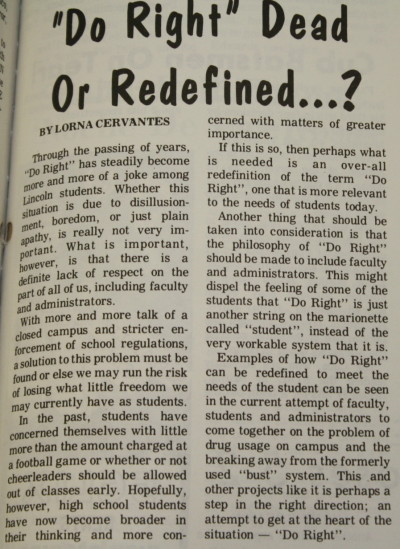
Through the passing of years, “Do Right” has steadily become more and more of a joke among Lincoln students. Whether this situation is due to disilusion-ment, boredom, or just plain apathy, is really not very important , what is important, however, is that there is a definite lack of respect on the part of all of us, including faculty and administrators.
With more and more talk of a closed campus and stricter enforcement of school regulations, a solution to this problem must be found or else we may run the risk of losing what little freedom we may currently have as students.
In the past, students have concerned themselves with little more than the amount charged at a football game or whether or not cheerleaders should be allowed out of class early. Hopefully,however, high school students have now become broader in their thinking and more concerned with matters of greater importance.
If that is so, then perhaps what is needed is is an over-all redefinition of the term “Do Right”, one that is more relevant to the needs of students today.Another thing that should be taken into consideration is that the philosophy of “Do Right” should be made to include faculty and administrators. This might dispel the feeling of some of the students that “Do Right” is just another string on the marionette caled “student”, instead of the very workable system that it is.
Examples of how “Do Right” can be redefined to meet the needs of the student can beseen in the current attempt of faculty, students and administrators to come together on the problem of drug usage on campus and the breaking away from the formerly used “bust” system. This and other projects like it is perhaps a step in the right direction; an attempt to get at the heart of the situation-”Do Right.”
###
Do-Right..
June 2, 1972
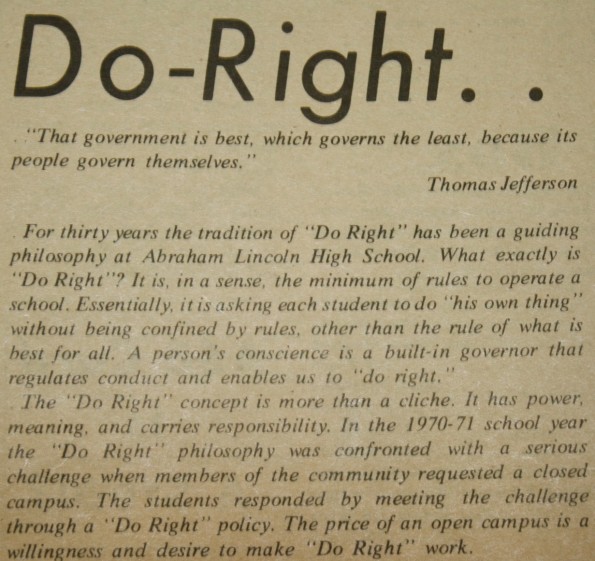
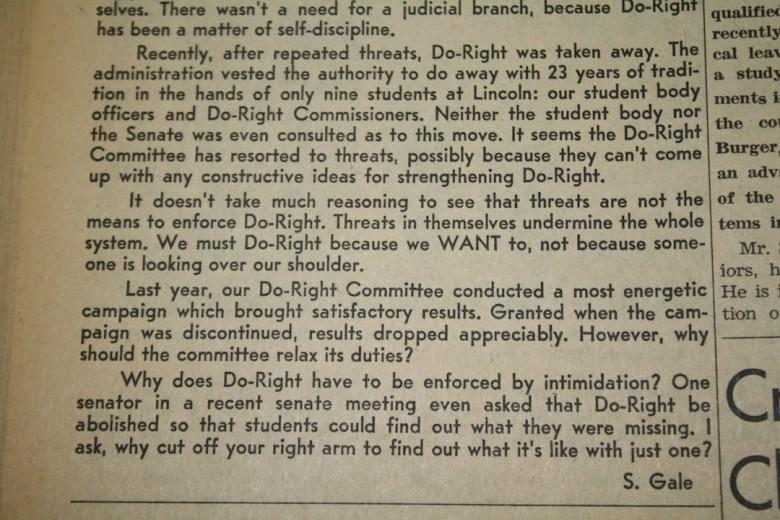
..”That government is best, which governs the least, because its people govern themselves.”
– Thomas Jefferson
For thirty years the tradition of “Do Right” has been guiding philosophy at Abraham Lincoln High School. What exactly is “Do Right”? It is, in a sense, the minimum of rules to operate a school. Essentially, it is asking each student to do “his own thing” without being confined by rules, other than the rule of what is best for all. A person’s Conscience is a built-in governor that regulates conduct and enables us to “do right.”
The “Do Right” concept is more than a cliche. It has power, meaning, and carries responsibility. In the 1970-71 school year the “Do Right” philosophy was confronted with a serious challenge when members of the community requested a closed campus. The students responded by meeting the challenge through a “Do Right” policy. The price of an open campus is a willingness to desire to make “Do Right” work.
Recently, after repeated threats, Do-Right was taken away. The administration vested the authority to do away with 23 years of tradition in the hands of only nine students at Lincoln: our student body officers and do-right commissioners. Neither the student body nor the Senate was even consulted as to this move. It seems the Do-Right Committee has resorted to threats, possibly because they can’t come up with any constructive ideas for strengthening Do-Right.
It doesn’t take much reasoning to see that threats are not the means to enforce Do-Right. Threats in themselves undermine the whole system. We must Do-Right because we WANT to not because someone is looking over our shoulder.
Last year, our Do-Right Committee conducted a most energetic campaign which brought satisfactory result. Granted when the campaign was discontinued, result dropped appreciably. However, why should the committee relax its duties?
Why does Do-Right have to be enforced by intimidation? One senator in a recent senate meeting even asked that Do-Right be abolished so that students could find out what they were missing. I ask, why cut off your right arm to find out what it’s like with one?
S.Gale
###
“Solution: appoint Do-Right Committee”
From the December 5, 1975 edition of “Lion Tales”
Open campus: A liberty that Lincoln students enjoy, allowing them to leave campus during lunch and free periods.
- Vandalism of residential property must stop. The residents of the community are the ones who give us the liberty of an open campus and they can very easily take away that liberty.
- Drag racing on residential streets must halt. All it takes is one small miscalculation and you and probably some of the people around you won’t ever have to worry about either driving or dragging.
- False fire alarms and bomb threats must cease. There is not only a severe penalty for those who are caught setting off an alarm or calling a bomb threat but they cause class disruptions and can lead to endangerment of the student body if and when the real thing occurs. Already false alarms have become so frequent that many teachers wait until the second or third series of bells before evacuating their classes. In a real fire this delay could prove fatal.
The solution to these problems is not simple. But if the student body would re-establish the Do-Right Commissioner and Do-Right Committee, these problems could be reduced.
Do we have it?
“Gang member speaks out”
What does that sentence mean to some people? For Tony Lopez, of Salinas, it means being confined to a wheelchair for the rest of his life.
Guest Writer
The Big Bone Alliance consisted of 8 Lincoln students and 6 San Jose High students. We united as one school to hep Hurricane Katrina victims. After five years, much still looks the same as it was just after the storm. Many families ended up homeless or moved away. Only 30% of families living there moved back. I would find it difficult to return to a home that is no longer there, or to my trashed neighborhood.

